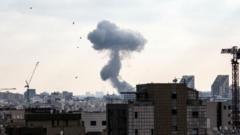The U.S. strikes aim to hinder Iran's nuclear ambitions, heightening geopolitical tensions and drawing mixed reactions from officials and citizens alike.
US Military Launches Airstrikes on Iran's Nuclear Facilities: Tensions Escalate in the Region

US Military Launches Airstrikes on Iran's Nuclear Facilities: Tensions Escalate in the Region
Fears mount over Iranian retaliation following targeted attacks on nuclear sites as Gulf nations express concern.
June 22, 2025, 2:13 p.m. ET
Washington, D.C. – The U.S. military conducted precision airstrikes against three critical Iranian nuclear facilities over the weekend, a move that has fueled fears of a wider conflict in the region. Trump administration officials insist that the operation was aimed solely at Iran's nuclear program and not intended to trigger a full-scale war.
According to Pentagon reports, the U.S. strikes, involving advanced B-2 bombers and cruise missiles, inflicted considerable damage on Iran's nuclear capabilities, particularly at the sites of Fordo, Natanz, and Isfahan. Initial assessments indicate that while substantial damage was done, it remains uncertain whether Iran retains any capacity for further nuclear enrichment.
In a statement from the White House, President Trump declared the operation a complete success, claiming Iran's nuclear facilities were “decimated.” However, military leaders caution that final evaluations will take time and preliminary reports suggest that the fortified Fordo site remains mostly intact.
Iran, in response, has vowed to defend its territory and threatened to retaliate against U.S. military installations across the Gulf states, signaling potential risks for U.S. personnel stationed in the region. “Our military bases, far from being a point of strength, are a vulnerability,” a spokesperson for Iran’s Islamic Revolutionary Guards Corps asserted.
Gulf nations, walking a tightrope between their longstanding alliance with the U.S. and regional instability, issued statements urging de-escalation without outright condemning Washington's actions. Saudi Arabia, Qatar, and the UAE expressed concern while calling for peace and restraint, underlining their fears about potential Iranian retaliation impacting their countries.
The conflict, which initially flared with Israeli strikes on Iranian positions earlier this month, has prompted a wave of responses from Iran, including a barrage of missiles targeting Israel shortly after the U.S. airstrikes. Analysts predict an escalation as Iran recalibrates its military strategy following these U.S. interventions.
Both the Israeli military and U.S. officials are assessing the repercussions of the strikes, with Israeli intelligence indicating increased Iranian aggression is likely in the wake of the American air operations. As the Middle East grapples with these developments, international observers are bracing for potential wider conflict stemming from the renewed tensions.
What remains evident is the precarious nature of this aggressive maneuver; while the goal was to signal a strong stance against Iran's nuclear ambitions, the long-term ramifications could reshape geopolitical landscapes, inviting deeper violence or a renewed diplomatic effort to calm the situation.
Washington, D.C. – The U.S. military conducted precision airstrikes against three critical Iranian nuclear facilities over the weekend, a move that has fueled fears of a wider conflict in the region. Trump administration officials insist that the operation was aimed solely at Iran's nuclear program and not intended to trigger a full-scale war.
According to Pentagon reports, the U.S. strikes, involving advanced B-2 bombers and cruise missiles, inflicted considerable damage on Iran's nuclear capabilities, particularly at the sites of Fordo, Natanz, and Isfahan. Initial assessments indicate that while substantial damage was done, it remains uncertain whether Iran retains any capacity for further nuclear enrichment.
In a statement from the White House, President Trump declared the operation a complete success, claiming Iran's nuclear facilities were “decimated.” However, military leaders caution that final evaluations will take time and preliminary reports suggest that the fortified Fordo site remains mostly intact.
Iran, in response, has vowed to defend its territory and threatened to retaliate against U.S. military installations across the Gulf states, signaling potential risks for U.S. personnel stationed in the region. “Our military bases, far from being a point of strength, are a vulnerability,” a spokesperson for Iran’s Islamic Revolutionary Guards Corps asserted.
Gulf nations, walking a tightrope between their longstanding alliance with the U.S. and regional instability, issued statements urging de-escalation without outright condemning Washington's actions. Saudi Arabia, Qatar, and the UAE expressed concern while calling for peace and restraint, underlining their fears about potential Iranian retaliation impacting their countries.
The conflict, which initially flared with Israeli strikes on Iranian positions earlier this month, has prompted a wave of responses from Iran, including a barrage of missiles targeting Israel shortly after the U.S. airstrikes. Analysts predict an escalation as Iran recalibrates its military strategy following these U.S. interventions.
Both the Israeli military and U.S. officials are assessing the repercussions of the strikes, with Israeli intelligence indicating increased Iranian aggression is likely in the wake of the American air operations. As the Middle East grapples with these developments, international observers are bracing for potential wider conflict stemming from the renewed tensions.
What remains evident is the precarious nature of this aggressive maneuver; while the goal was to signal a strong stance against Iran's nuclear ambitions, the long-term ramifications could reshape geopolitical landscapes, inviting deeper violence or a renewed diplomatic effort to calm the situation.






















